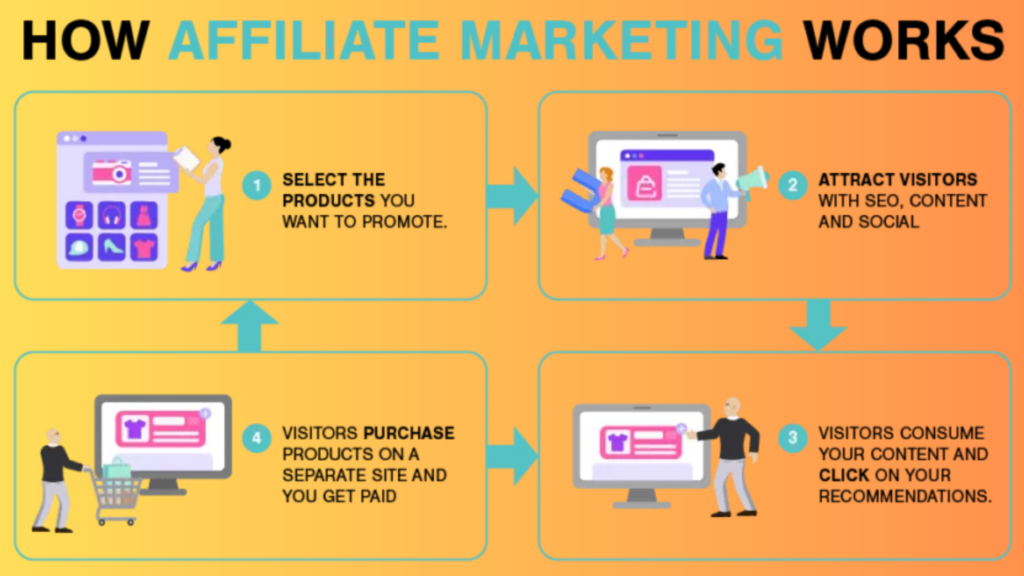What is affiliate Marketing ?
Hey there! Let’s talk about something that’s been buzzing around the online world lately – affiliate marketing. You’ve probably heard about it: the idea of earning money while you sleep, just by recommending products or services you love. Sounds pretty cool, right? But here’s the burning question on everyone’s mind: Are affiliate programs really worth all the hype? And guess what? We’re not going to do it alone. Nope, we’ve got some industry experts on board, and we’ll be tapping into their insights to give you the full picture.
wondering if affiliate marketing is appropriate palatiform to earn money in 2024?It’s basically like being a digital matchmaker. You connect people with products or services they’re interested in, and when they make a purchase or sign up, you get a little something in return – usually a commission. It’s a win-win situation for everyone involved, right?
Throughout this in-depth analysis, we’ll dissect the various facets of affiliate marketing, exploring its pros and cons, dispelling common myths, and offering practical insights for aspiring affiliates. By drawing on insights from industry experts and examining real-world case studies, we aim to equip readers with the knowledge and understanding they need to navigate the complex world of affiliate marketing effectively.
Are affiliate programs worth it? Still in 2024 ?
Wondering if diving into affiliate programs is worth your time and effort still in 2024 ? This article breaks it down for you in simple, everyday language. We’ll explore the ins and outs of affiliate marketing, considering whether it’s a path to success or just another online hustle. With insights drawn from real-world experiences and industry articles, we’ll uncover the truth behind the buzz. So, if you’re curious about making money online through affiliate programs, stick around for some straight talk!

Understanding Affiliate Marketing and it’s core concept
Affiliate marketing is a dynamic online strategy where individuals, known as affiliates, promote products or services on behalf of companies or merchants. The core concept revolves around a mutually beneficial partnership between affiliates and merchants, where affiliates earn commissions for driving traffic or sales to the merchant’s website through their promotional efforts. In simpler terms, affiliates act as intermediaries, connecting consumers with products or services they’re interested in, and earning a commission for each successful referral or sale they generate. This symbiotic relationship allows merchants to expand their reach and increase sales, while affiliates have the opportunity to monetize their online presence by leveraging their audience and promotional skills.
How Affiliate Marketers Earn Commissions through promotional Activities?
Affiliate marketers earn commissions through various promotional activities that drive traffic and sales to the products or services they promote. Drawing inspiration from the insights shared in the provided articles, here’s how they typically do it:
- Content Creation: Affiliate marketers engage in content creation across different platforms such as blogs, social media, videos, and emails. They produce valuable content like reviews, tutorials, guides, and recommendations that resonate with their target audience. By highlighting the benefits and features of the products or services they’re promoting, affiliates aim to attract potential buyers and encourage them to make a purchase.
- Strategic Promotion: Affiliates strategically promote affiliate links within their content, seamlessly integrating them into their recommendations or discussions. They use persuasive language and compelling visuals to capture the audience’s attention and motivate them to click on the affiliate links. Additionally, affiliates leverage various marketing channels, including search engine optimization (SEO), social media marketing, email marketing, and influencer partnerships, to expand their reach and attract more visitors to their affiliate links.
- Audience Engagement: Successful affiliate marketers prioritize building and nurturing relationships with their audience. They actively engage with their followers by responding to comments, addressing questions, and providing helpful insights. By establishing trust and credibility with their audience, affiliates can influence purchasing decisions and increase their chances of earning commissions. Moreover, they continuously analyze audience feedback and behavior to refine their promotional strategies and enhance the effectiveness of their campaigns.
- Monitoring Performance: Affiliate marketers closely monitor the performance of their promotional activities to track their effectiveness and optimize their strategies accordingly. They use analytics tools and affiliate marketing platforms to measure key metrics such as click-through rates, conversion rates, and earnings. By analyzing these metrics, affiliates can identify high-performing content, identify areas for improvement, and make data-driven decisions to maximize their earnings potential.
Overall, affiliate marketers employ a combination of strategic content creation, targeted promotion, audience engagement, and performance monitoring to earn commissions through their promotional activities. By understanding their audience’s needs and preferences and delivering valuable content that addresses those needs, affiliates can drive traffic and sales to the products or services they promote, ultimately earning commissions in the process.

Exploring the Pros and Cons of Affiliate Marketing
pros and cons
Pros of Affiliate Marketing:
- Low Startup Costs: Affiliate marketing offers a low barrier to entry, requiring minimal upfront investment. Unlike traditional businesses that may require significant capital for product development, inventory, or storefronts, affiliate marketers can get started with just a website or social media platform. This accessibility allows aspiring entrepreneurs to launch their affiliate marketing business with little financial risk.
- Minimal Sales and Customer Support Responsibilities: One of the key advantages of affiliate marketing is that affiliates are not responsible for handling sales transactions or customer support inquiries. Instead, the merchant manages these aspects of the business, including order processing, shipping, and customer service. This frees up affiliates to focus on creating valuable content and driving traffic to their affiliate links without the burden of logistical challenges.
- Scalability and Flexibility: Affiliate marketing offers scalability and flexibility, allowing marketers to grow their business at their own pace and on their own terms. Affiliates can scale their efforts by creating more content, expanding their promotional channels, or diversifying their product offerings. Moreover, affiliate marketing is location-independent, enabling marketers to work from anywhere with an internet connection and manage their own schedule, providing the freedom to pursue other interests or commitments.
- Unlimited Earnings Potential: One of the most attractive aspects of affiliate marketing is its unlimited earnings potential. Unlike traditional employment where income is typically fixed or capped, affiliate marketers have the opportunity to earn as much as they want based on their performance. Successful affiliates can generate passive income streams that continue to grow over time, allowing them to achieve financial freedom and independence.
- Ample Selection of Affiliate Programs: Affiliate marketers have access to a wide range of affiliate programs across various industries and niches, providing ample opportunities for monetization. Whether it’s health and wellness, technology, fashion, or finance, there are affiliate programs available for almost every niche imaginable. Additionally, affiliate networks like Impact, CJ Affiliate, and ShareASale offer a diverse selection of products and services to promote, giving affiliates the flexibility to choose programs that align with their interests and expertise.
cons of affiliate marketing :
- Initial Learning Curve: While affiliate marketing offers low barriers to entry, there is still an initial learning curve for newcomers. Affiliates must familiarize themselves with effective marketing strategies, content creation techniques, and affiliate program management. This learning process may require time and effort, especially for those who are new to digital marketing or online business.
- Lack of Ownership Over Promoted Businesses: One of the drawbacks of affiliate marketing is that affiliates do not have ownership or control over the businesses they promote. While affiliates may invest time and resources into creating content and driving traffic to affiliate links, they ultimately rely on the merchant’s products or services to convert visitors into customers. This lack of ownership can limit affiliates’ ability to influence the customer experience or make changes to the underlying business.
- Dependency on Merchant Performance: Affiliate marketers’ success is closely tied to the performance of the merchants they promote. Factors such as the quality of the products or services, merchant conversion rates, and market demand can impact affiliates’ earnings. While affiliates can optimize their promotional efforts, they ultimately have little control over how merchants operate their businesses or respond to market changes.
- Fluctuating Commissions and Delayed Gratification: Affiliate marketing income can be variable and subject to fluctuations due to changes in commission structures, merchant policies, or market dynamics. Additionally, affiliates may experience delays in receiving commissions, as payments are typically made on a monthly basis and subject to minimum thresholds. This delayed gratification can be challenging for affiliates who are accustomed to more immediate forms of compensation.
- Challenges in Program Management and Disclosure/Trust Issues: Managing multiple affiliate programs can be complex and time-consuming, especially for affiliates who promote products or services across different networks. Additionally, affiliates must adhere to disclosure requirements and build trust with their audience to maintain credibility and compliance with regulatory guidelines. Failure to disclose affiliate relationships or address trust issues can damage the affiliate’s reputation and impact their ability to attract and retain customers.
Debunking Myths About Affiliate Marketing
Affiliate marketing often comes with its fair share of misconceptions, but let’s set the record straight. Here, we’ll address some of the most common myths and reveal the truths behind them:
| Affiliate Marketing Myth | Affiliate Marketing Truth |
|---|---|
| Get-rich-quick scheme | While affiliate marketing can be lucrative, it requires time, dedication, and strategic planning. |
| Audience size requirements | Niche-focused and engaged audiences can be more valuable than sheer numbers, quality often trumps quantity. |
| Immediate passive income | Passive income is possible, but it usually takes time and effort to build up to a level where income becomes passive. |
| Universality of affiliate marketing | Affiliate marketing isn’t for everyone; it requires grit, digital marketing skills, content creation, and communication. |
| Promotion of any product | Promoting products without considering quality, relevance, or audience fit can damage credibility and hinder success. |
| Saturation of the market | While some niches are competitive, there are always opportunities in less crowded markets or unique angles within niches. |
| Sole focus on sales | Successful affiliates focus on providing value and meeting the needs of their audience, not just driving sales. |
| Website necessity | While beneficial, a website isn’t necessary; social media platforms, email marketing, and other channels can be effective. |
| Copying successful marketers | Success often involves finding a unique approach; copying strategies may not work for your audience. |
| Decline of affiliate marketing | The industry is thriving, with new opportunities emerging from changes in consumer behavior, technology, and trends. |
- Get-rich-quick scheme: Myth – Many believe that affiliate marketing promises instant wealth with minimal effort. Truth – While it’s true that affiliate marketing can be lucrative, building a successful business takes time, dedication, and strategic planning.
- Audience size requirements: Myth – Some think you need a massive audience to succeed in affiliate marketing. Truth – While a large audience can be beneficial, niche-focused and engaged audiences can be more valuable than sheer numbers. Quality often trumps quantity in this field.
- Immediate passive income: Myth – There’s a misconception that affiliate marketing offers immediate passive income from the start. Truth – While passive income is possible with affiliate marketing, it usually takes time and effort to build up to a level where income becomes more passive.
- Universality of affiliate marketing: Myth – It’s often believed that affiliate marketing is suitable for everyone. Truth – Affiliate marketing isn’t for everyone. Success in this field requires grit, digital marketing skills, content creation abilities, and effective communication.
- Promotion of any product: Myth – Some think you can promote any product and make money through affiliate marketing. Truth – Promoting products without considering their quality, relevance, or audience fit can damage your credibility and hinder your success. Thoughtful product selection and planning are essential.
- Saturation of the market: Myth – Many believe that the affiliate marketing market is oversaturated. Truth – While some niches are indeed competitive, there are always opportunities in less crowded markets or by finding unique angles within popular niches.
- Sole focus on sales: Myth – It’s a misconception that affiliate marketing is solely about driving sales. Truth – Affiliates are responsible for building trust with their audiences and providing valuable content. While sales are important, successful affiliates focus on delivering value and meeting the needs of their audience.
- Website necessity: Myth – Some believe that you need a website to start affiliate marketing. Truth – While having a website or blog can be beneficial, it’s not the only way to approach affiliate marketing. Social media platforms, email marketing, and other channels can also be effective for affiliate marketing.
- Copying successful marketers: Myth – There’s a belief that copying the strategies of successful affiliate marketers will lead to success. Truth – What works for one person’s audience might not work for yours. Success in affiliate marketing often involves finding a unique approach that resonates with your audience.
- Decline of affiliate marketing: Myth – Some believe that affiliate marketing is on the decline. Truth – On the contrary, the affiliate marketing industry is evolving and thriving, with new opportunities arising from changes in consumer behavior, technology, and market trends. Businesses continue to embrace affiliate marketing due to its performance-based nature and potential for win-win outcomes.
A Day in the Life of an Affiliate Marketer
Ever wondered what a typical day looks like for an affiliate marketer? Let’s take a peek behind the scenes and explore the daily activities of these digital entrepreneurs:
Morning Routine:
As the sun rises, affiliate marketers dive into their inbox, sifting through emails from affiliate programs, advertisers, and updates on sales events. It’s the perfect time to catch up on the latest industry news and program announcements.
Next up, it’s time to crunch some numbers. Marketers review website and campaign analytics, analyzing traffic, conversion rates, and earnings from the previous day or week. This data helps them gauge the performance of their promotional efforts and fine-tune their strategies for maximum effectiveness.
With the analytical work done, it’s onto the creative side of things. Affiliate marketers roll up their sleeves and dive into content creation mode. Whether it’s crafting compelling blog posts, shooting engaging videos, or designing eye-catching graphics, they’re always working to produce content that resonates with their audience.
But it’s not all about creating content. Affiliate marketers also focus on engaging with their audience on social media platforms, responding to comments and messages, and sharing relevant content. Building relationships and fostering community engagement are key to success in the world of affiliate marketing.
Afternoon Tasks:
As the day progresses, affiliate marketers shift their focus to industry research and program exploration. They scour the web for the latest trends, attend webinars, and explore new affiliate programs and networks to join. Staying informed and keeping up with industry developments is essential for staying ahead of the curve.
Of course, no day would be complete without a bit of administrative work. Marketers track expenses, manage payments from affiliate programs, and update their websites or promotional materials as needed. They also keep a close eye on competitors, analyzing their strategies and looking for opportunities to improve their own.
Evening Relaxation and Planning for the Next Day:
As the sun sets, affiliate marketers take some time to unwind and recharge. Whether it’s hitting the gym, spending time with family and friends, or pursuing hobbies and interests, it’s important to take breaks and avoid burnout.
But the work never truly stops. Before calling it a day, affiliate marketers take some time to plan and prepare for the next day. They set goals, create to-do lists, and strategize their content and marketing efforts to ensure continued success in the ever-evolving world of affiliate marketing.
When Affiliate Marketing May not be Worth It ?
While affiliate marketing can be a lucrative venture, there are scenarios where it may not be the right fit:
Money-First Mentality and Low-Quality Content Creation:
Some individuals approach affiliate marketing with a money-first mentality, prioritizing profits over providing value to their audience. They may resort to creating low-quality content with the sole aim of making a quick buck, rather than focusing on delivering genuine value and building trust with their audience.
Unrealistic Expectations of Quick Riches:
Affiliate marketing is not a get-rich-quick scheme. It requires time, effort, and dedication to build a successful business. Those who enter the field with unrealistic expectations of overnight success are likely to be disappointed and may give up prematurely.
Overreliance on Automation or Outsourcing:
While automation tools and outsourcing can be valuable resources for affiliate marketers, overreliance on them can backfire. Relying too heavily on automation may lead to a lack of personalization and authenticity in marketing efforts, ultimately alienating the audience.
Ineffectiveness of Copying Others’ Strategies:
Simply copying the strategies of successful affiliate marketers is unlikely to lead to success. What works for one marketer’s audience may not resonate with another’s. Success in affiliate marketing often requires a unique approach tailored to the marketer’s niche, audience, and personal strengths.
Conclusion:
In conclusion, while affiliate marketing offers tremendous potential for earning passive income and building a successful online business, it’s not without its challenges. Marketers must approach the field with a genuine desire to provide value to their audience, a willingness to put in the hard work, and a commitment to continual learning and improvement. Affiliate marketing still profitable in 2024. So, anyone can try it out.
Firstly, we’ve learned about the core concept of affiliate marketing, where individuals promote products or services and earn commissions for driving sales or leads. It’s a dynamic realm where digital marketers leverage their skills to create engaging content and drive traffic to affiliate partners.
Secondly, we’ve explored the pros and cons of affiliate marketing. On the positive side, it offers low startup costs, scalability, and flexibility, allowing individuals to build passive income streams with minimal upfront investment. However, there are challenges, including the initial learning curve, dependency on merchant performance, and fluctuating commissions.
Next, we debunked common myths surrounding affiliate marketing, emphasizing the importance of realistic expectations and diligent effort. Contrary to misconceptions, affiliate marketing isn’t a get-rich-quick scheme nor does it guarantee immediate passive income. Success requires dedication, strategy, and a long-term perspective.
We also took a glimpse into the daily life of an affiliate marketer, highlighting the diverse tasks involved, from content creation and audience engagement to industry research and competitor analysis. It’s a dynamic field that demands creativity, adaptability, and perseverance.
As we wrap up, it’s essential to reiterate the significance of weighing the pros and cons before embarking on an affiliate marketing journey. While the potential for success is vast, it’s crucial to approach it with realistic expectations and a willingness to learn and adapt.
I encourage you, dear reader, to reflect on the insights shared and consider how they align with your goals and aspirations. Whether you’re a seasoned marketer or just starting, thoughtful consideration and informed decision-making will pave the way for success. Here at parttimeworkfromhomejobs.com we discussed about lot affiliate platforms that you can use for making passive online money in 2024.
I invite you to share your thoughts, questions, or experiences in the comments below. Let’s continue the conversation and empower each other on our affiliate marketing endeavors.
FAQ’S:
Can you really make money being an affiliate?
Yes, it’s entirely possible to make money as an affiliate marketer. Many individuals and businesses have found success in this field, earning substantial income through commissions from promoting products or services. However, it’s essential to approach affiliate marketing with realistic expectations and a strategic mindset. Success in affiliate marketing often requires time, effort, dedication, and the implementation of effective marketing strategies. By choosing the right niche, building a loyal audience, creating high-quality content, and fostering strong relationships with affiliate partners, you can indeed generate significant revenue as an affiliate marketer.
Are affiliate programs worth doing?
Deciding if affiliate programs are worth pursuing depends on various factors. It involves creating content, so if you enjoy content creation, it could be for you. Success requires digital marketing skills like SEO and audience engagement, so assess your skills. Affiliate marketing offers passive income opportunities, but it requires ongoing effort. Research market trends and potential ROI to gauge profitability. Choose a niche aligned with your interests and consider audience size and engagement. Be aware of competition and evaluate your ability to stand out. Affiliate marketing requires patience and persistence as results may take time to manifest. Ultimately, weigh these factors against your goals and commitment to decide if affiliate programs are right for you.
Is affiliate marketing worth it for beginners?
For beginners, affiliate marketing can be worth it, but success doesn’t come overnight. It involves creating content, engaging with audiences, and learning digital marketing skills. While it offers low startup costs and scalability, there’s an initial learning curve. Beginners should focus on niche selection, audience engagement, and quality content creation. With dedication and perseverance, beginners can find success in affiliate marketing, but it requires patience and a long-term perspective.
Is affiliate marketing very profitable in 2024 ?
Affiliate marketing can still be profitable in 2024, but success depends on various factors. With the right strategies, niche selection, and audience engagement, affiliates can generate significant income. However, it’s essential to understand that success won’t happen overnight. Building a successful affiliate business takes time, dedication, and continuous effort. Additionally, staying updated with industry trends, adapting to changes in consumer behavior, and leveraging new technologies are crucial for maximizing profitability in affiliate marketing.
Is affiliate marketing halal in Islam?
Affiliate marketing in Islam can be permissible if it promotes Halal products or services and follows ethical marketing practices. However, promoting Haram items or using deceptive methods would be considered impermissible. It’s essential to adhere to Islamic principles and seek guidance when in doubt.
What is the highest paying affiliate programs?
The highest-paying affiliate programs often come from industries like finance, technology, online education, health, and fashion. They offer competitive commissions for promoting their products or services. When choosing an affiliate program, look for ones that align with your audience and niche, offer good commission rates, and provide quality products or services.

